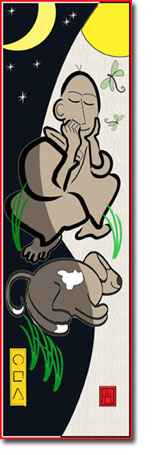On The Way: The Daily Zen Journal
Mud and Water 1
Bassui (1327-1387)
The way of Zen began without the establishment of any sect. It is simply a religion which points to the one original mind of all Buddhas and ordinary people. This mind is nothing other than Buddha nature. To see this nature is what is meant by religious practice.
When you realize your Buddha nature, wrong relationships will instantly disappear, words will be of no concern, and the dust of the dharma will not stain you. This is what is called Zen. Attaining Zen is becoming a Buddha. This real Buddha is none other than the heart of all beings, the master of seeing, hearing, and perceiving.
When one becomes enlightened in this way, body and mind are both Zen. For whom is it easy to obtain? For whom is it difficult to obtain? From ancient times up to the present there has not been a single person who has attained Buddhahood without seeing into their original nature.
Of the seventeen hundred and one beings listed in the Transmission of the Lamp, all have pointed directly to people’s minds, making them see into their own nature solely and thus become Buddhas. Moreover, the virtuous priests who followed all taught the transmission of mind through the mind exclusively.
Enlightened beings earnestly point to the dharma of mind, while the unenlightened, seeking Buddha outside the mind, wholeheartedly practice the dharma of existent phenomena. They are different as black and white. Like fire and water they can never mix.
Though the Buddha Way is for the purpose of realizing the important matter of cause and effect, when I see how a passing fancy can cause one to believe a teacher of false views, I realize how easily one’s karmic inclination can influence one’s beliefs.
But the karmic inclination people have toward the Buddha Way is far more intimate than their karmic inclination toward an individual. By dharma, I mean dharma of mind. Can one be without karmic inclination toward his own mind? Realizing the Buddha mind with your own mind is like the sky realizing the sky. How then will you deal with a teacher of false views who sets up barriers where there are none?
Questioner: Even though one has the aspiration and practices the Way, if he meets a teacher of false views, he will surely enter the false path. How can one recognize the difference between a teacher of false views and a true teacher?
Bassui: If a practitioner wishes to distinguish a teacher of false views from a true teacher, he must first look into the true nature of his own mind carefully, and use this power of realization to make the distinction  between the two types of teachers.
between the two types of teachers.
Even then, trying to perceive the great dharma from one’s narrow viewpoint is like a mosquito trying to bite an iron cow. Clearly one who tries to discriminate between a teacher of false views and a true teacher through his own feelings is like one who tries to light up heaven with the light of a lightning bug. How can one ever come close to proper discernment?
Questioner: In that case, many beginning practitioners who believed in teachers of false views would spend their lives in vain; isn’t there some sign to make them aware of their mistake?
Bassui: The true teacher is one who has seen into his own nature. One who gives sermons while not having seen into his own nature is a false teacher.
A good teacher is one who combines understanding and practice and has no lingering delusions. These lingering delusions are ones that persist as a result of old habits. The Zen Master Engo said: “If he hasn’t cut through to full function, attained great freedom, why live and die with such a one? Why do I say this? Because he has not eliminated lingering delusions of good and bad, right and wrong.”
Bassui (1327-1387)
Excerpted from Mud and Water – A Collection of Talks by the Zen Master Bassui -Translated by Arthur Braverman 1989




We live in very different times compared to those of Japan in the 1300’s, but the search for a true teacher or master beckons to students of every century. Bassui’s quest began the way it does in any person strong enough to question for themselves. Long before he had met any teacher at the age of 4 during a memorial service for his father, he asked the priest how his father could eat the offerings on the altar. When told his soul would eat the offerings, he asked, “What is thing this called a soul?” Thus began a very early period of inquiry. At age nine a new question arose, “Who is this one who sees, hears, and understands?”
The heart of Bassui’s teaching is always to point the person back into the true nature of their own mind. In this selection Bassui is responding to a questioner asking about finding a true teacher. This is a timeless question, and very few people actually answer it straightforwardly. Ultimately on our deepest level we can see the truth in any situation or person if we choose to see clearly. The three lingering delusions that Tozan refers to are the very aspects that obscure true seeing.
In our times many are practicing without a teacher; most could not endure the 17 years of wandering that Bassui invested in seeking to deepen his understanding visiting the various Zen Masters of the times. For many the question goes even further than finding a true teacher, it edges into the very unknown waters of seeing into one’s own mind without a teacher. But for many that is just what will happen. That is the power of asking and staying with your questions throughout time.
Tokukei: Why don’t you wear
monk’s robes?
Bassui: I became a monk to understand the great matter of life and death, no to wear Buddhist robes.
Tokukei: Then are you looking into the koans of the old masters?
Bassui: Of course not. How can I appreciate the words of others when I don’t even know my own mind?
Tokukei: Well, then, how do you approach your religious practice?
Bassui: I want to clarify the source of the great Dharma handed down by the Buddhas and the patriarchs. After attaining enlightenment, I want to save the bright and the dull, teaching each one according to his capacity. My true desire is to relieve others of their pain though I myself may fall into hell.
Hearing this Tokukei simply put his palms together and bowed. A friendship grew between these two monks from that time.
May our minds be clear!
Elana